| Clutching My Pearls is my ongoing blog series about my take on Jane Austen’s beliefs and ideas, as based on her novels. Folks today who love Jane Austen are eager to acquit her of being a woman of the long 18th century. Further, for some people, reinventing Jane Austen appears to be part of a larger effort to jettison and disavow the past. Click here for the first in the series. |
| As discussed in my previous post, Sir Thomas Bertram was an educated man, and a member of Parliament. He would have been thoroughly familiar with the slavery debate as it played out in Parliament and the press in the decades leading up to the evening that Fanny Price asked her question about the slave trade, a question he answers. (Previous posts about this passage here and here). He would have known the many arguments pro and con. He was also almost certainly a slaveowner. We know that Fanny showed interest and pleasure in his answer to her question. So what could that question have been, and what was the answer? I think scholar George Boulukos gives a plausible answer: the question had to do with amelioration. "Amelioration" means improving the living and working conditions of enslaved persons. Examples of benevolence include: not separating families, giving them their own little plots of land to cultivate in their spare hours, and converting them to Christianity. | Disclaimer: My motive in this post is to explain, not to excuse. I am sharing what I have learned about the slavery debate. However -- and it must be the contrarian in me -- I don't feel compelled to assure anyone that the views of 18th-century abolitionists are not nearly so enlightened as my own. |
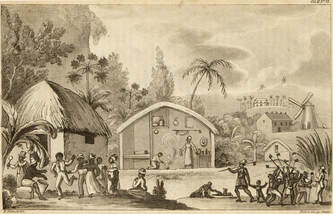 Idealized view of life in the West Indies
Idealized view of life in the West Indies The abolitionists hoped that ending the slave trade would mean the planters would be compelled to treat their captives better. If pleas to humanity and natural justice didn't work, economic reality might. To be blunt, when you could no longer buy a fresh supply of slaves, you couldn't work your existing slaves to death.
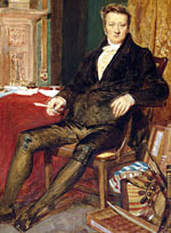 Thomas Clarkson, abolitionist
Thomas Clarkson, abolitionist As Boulukos explains, “The crucial distinction is between the guilt of the African slave trader and the possibility that planters, by contrast, will do good for their charges, particularly in the way of Christian instruction and amelioration."
"This concept was put forward not only by the defenders of the planters," Boulukos points out, "but also by such abolitionists as William Wilberforce, the parliamentary leader of Abolition, and Thomas Clarkson, with whom Austen claimed to be ‘in love’ in an 1813 letter to Cassandra.”
Jane Austen may well have been persuaded by Clarkson et al that amelioration was a pragmatic compromise until full abolition could be achieved. Boulukos again: “The one book about slavery and abolition that Austen is widely thought to have read—Clarkson’s History—supports the idea that outlawing the trade would inevitably improve the condition of slaves.”
It also appears that abolitionists knew they could only get so far in arguing against slavery on the basis of its horrendous cruelty, not when they were up against powerful economic and geopolitical interests. Abolitionist James Stephen won Parliamentary support for suppressing the slave trade by arguing that it would damage the economic interests of the French, with whom Britain was at war. Focusing first on eliminating the slave trade looks like a strategic decision on the part of the Abolitionist movement.
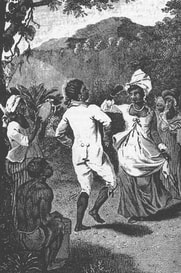 Dancing in St. Domingo
Dancing in St. Domingo Another 18th-century reality to bear in mind is that if Austen was an ardent Churchwoman, as her brother says, or a secret evangelist, as Dr. Helena Kelly claims, she would have been in favour of proselytizing Christianity to the four corners of the earth and saving souls. So, in common with Hannah More and William Wilberforce, she would have thought it a good thing to Christianize and "civilize" the enslaved population, and that doing so would better equip them for eventual emancipation.
I am not going to delve into the reasons that people feared "sudden emancipation" might be counter-productive. We should not be surprised to discover that the abolitionist movement, like all social movements, had internal disagreements and schisms, or that prediction and reality did not always align.
Boulukos thinks Austen is positioning Sir Thomas in the mold of benevolent slaveowners who featured in “grateful negro” fiction. But Austen wasn't explicit about it in Mansfield Park, as compared to Maria Edgeworth's story, so in the end, we can only speculate.
| To recap my previous posts, Mansfield Park has neither detail nor explicit opinions about slavery, though many have found symbolism in it. Many other novels of the period go into greater detail and express actual opinions, and I'll be discussing those. What sets Mansfield Park apart from those other novels is that it was written by Jane Austen. As George Boulukos says, Mansfield Park is “canonical and aesthetically extraordinary." But that doesn't mean that it is "representative of its culture.” My next posts discuss two issues arising out of this: If Mansfield Park is full of anti-slavery symbolism, does it make sense to write a novel about a wimpy heroine living with a bunch of horrible people and write a “happy ending” that isn’t actually happy at all? And I'll provide more detail about how other writers used the issue of slavery in their novels. |
| Previous post: Reading into the (dead) silence Next post: Symbolism in Mansfield Park Boulukos, George E. (2006). "The Politics of Silence: Mansfield Park and the Amelioration of Slavery." Novel : a Forum on Fiction, 39(3), 361–383. https://doi.org/10.1215/ddnov.039030361 Edward Henry Columbine (1763-1811) appears in A Marriage of Attachment, the second book in my Mansfield Trilogy. He is William Price's commander in Africa. He was an abolitionist, a commander of the West African Squadron and briefly served as governor of Sierra Leone, a colony established in Africa for freed slaves, Click here for more about my novels. |
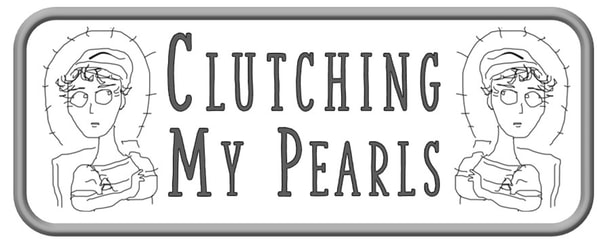
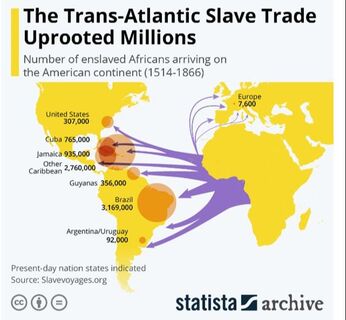
 RSS Feed
RSS Feed